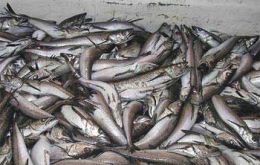MercoPress. South Atlantic News Agency
Fisheries
-
Monday, June 30th 2008 - 21:00 UTC
Chile: Whale meet ends with peace agenda

The annual meeting of the International Whaling Commission (IWC) has ended with member governments agreeing to try and resolve their differences.
-
Friday, June 27th 2008 - 21:00 UTC
Whaling meeting tries to freeze and delay divisive issues

The International Whaling Commission voted down Thursday a request by indigenous Greenland fishermen to kill 10 humpback whales a year. IWC is holding its annual assembly for the first time in Santiago de Chile.
-
Wednesday, June 25th 2008 - 21:00 UTC
Argentina: Fisheries exports register declines in volume, value
Argentina exported 190,446 tonnes of fish and shellfish worth USD 371.4 million in the first five months of 2008, indicate statistics released by the National Food Safety and Quality Service (SENASA). These figures represent an 11.2 per cent fall in volume and a 9.7 per cent drop in value compared to the same period last year when 214,373 tonnes were exported for USD 411.3 million.
-
Tuesday, June 24th 2008 - 21:00 UTC
Compromise on whale hunting still has not surfaced
A divided International Whaling Commission opened its annual conference in Chile on Monday with hope for a compromise on whale hunting, which continues around the world, spearheaded by Japan, despite a 22-year commercial ban.
-
Sunday, June 22nd 2008 - 21:00 UTC
First time meeting in Chile of Whaling Commission
Hundreds of government officials, scientists and NGO representatives from around the globe will converge at Santiago de Chile's Sheraton Hotel next week for the 60th Annual Meeting of the International Whaling Commission (IWC60).
-
Sunday, June 22nd 2008 - 21:00 UTC
EU plans hiking aid per fishing vessel to help with fuel cost
The European Parliament (EP) on Thursday proposed increasing fishing sector aid up to EUR 100,000 (from 30.000 EUR) per vessel, instead of per company – as is the case today - in order to alleviate the effect of rising fuel prices.
-
Saturday, June 21st 2008 - 21:00 UTC
Argentina bans all fishing in S. Atlantic Burwood Bank
Argentina banned all fishing activities to the south of the Falkland/Malvinas Islands and to the east of the Isla de los Estados in an area dominated by the Burwood bank. The ban, “total and permanent” was decided to preserve biodiversity in the area and in the framework of commitments agreed with FAO.
-
Wednesday, June 18th 2008 - 21:00 UTC
ISA has reached salmon farms in Magallanes Region
Salmon Infectious Anemia (ISA) which has been ravaging the salmon industry in Chile has reached the extreme south region of Magallanes, according to the country's Fisheries Service.
-
Tuesday, June 17th 2008 - 21:00 UTC
Outlook for hake in South Atlantic remains “worrisome”

The situation of common hake (Merluccius hubbsi) is extremely worrying in the South Atlantic as “low recruitment levels in the last three years are having an effect on the brood stock biomass” according to Argentina's Institute for Fisheries Research and Development (INIDEP) Research Director Otto Wohler.
-
Thursday, June 12th 2008 - 21:00 UTC
“Whale hunting ban is not enough to protect sanctuary”

A recent proposal to make Chile's entire coastline as a no-hunt whale sanctuary may not be enough to safeguard Chile's whales, according to world-renowned marine biologist and conservationist advocate Rodrigo Hucke-Gaete.
